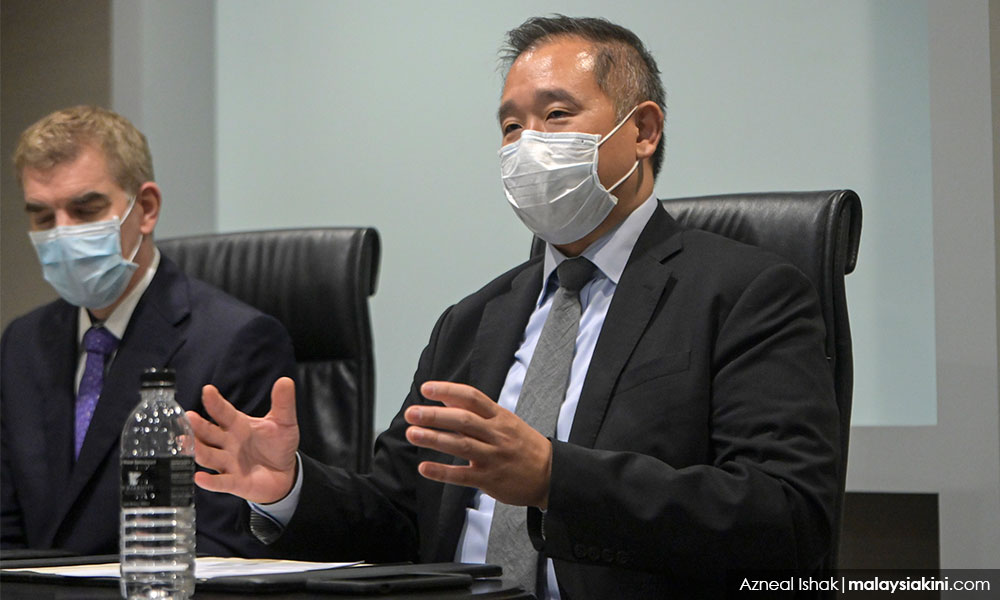The United States Customs and Border Protection (CBP), which banned some Malaysian corporations from moving goods to the US over alleged forced labour practices, said they rely on information supplied by "credible sources".
At a press conference in Kuala Lumpur, CBP Trade Office deputy executive assistant commissioner John P Leonard said the agency does not have any officers working in Malaysia.
According to him, all forced labour complaints lodged with CBP against Malaysian companies were investigated by their team in the US to find if there is enough evidence that forced labour was used in the manufacture of goods that are sent to the US.
"Within this country? No, we don't have. Obviously, we have our US embassy here but we don't have CBP officers who reside within the country to do this work," Leonard (above, left) said.
He was answering a question about whether the agency has agents in Malaysia to verify forced labour allegations against Malaysian companies.
Leonard was speaking during a media roundtable session organised by the US Embassy in Kuala Lumpur yesterday (June 2). Also at the session was Eric Choy, CBP acting executive director for Trade Remedy Law Enforcement.
Earlier, Leonard said the CBP is compelled to investigate allegations they receive from "credible sources".
Research to corroborate allegations
According to the officers, the level of evidence required under US law to issue a Withhold Release Order (WRO) is if they have reasonable suspicion of forced labour.
"When we investigate, we try to find material sources who help corroborate and get us the evidentiary level so we have reason to believe forced labour was used in the manufacture of goods brought into the US.
"Allegations can come in from investigative media, investigative journalists, our agency partners, other law enforcement sources, NGOs and CSOs (civil society organisations) that can submit these allegations.
"And when we receive those allegations, a lot of times a lot of information and material come along with that, as well as our own research, analysis. All these things get us to a point where we can corroborate information that gets us to that reasonable level of suspicion that forced labour is used in the manufacturing of goods entering the US," Choy added.

Asked if this means that all the investigations were done in the US, Choy said: "Certainly, our teams are based in the US."
Once CBP establishes there is good reason to suspect forced labour was used, the agency said it would be compelled to issue a WRO against the goods.
The items would be treated almost like narcotics, which are not allowed entry into the US, due to how the law is written.
CBP is also not required to consult the company in question before they issue a ban order.
Since 2019, CBP has issued eight import bans against rubber and palm oil goods produced by Malaysian companies over alleged involvement in forced labour.
Two of them have since been lifted after the companies carried out remediation as required by the agency.
Comprehensive legal review
Explaining further, Leonard said CBP's investigations are conducted according to US law.
However, Leonard stressed that the CBP does not simply issue WROs against companies, and they have to go through a legal review to make sure their case can stand up in court.
"...we don't issue WRO in a willy nilly fashion. There is a very, very comprehensive legal review that goes through it to make sure we meet that evidentiary standard to make sure it can stand up in court.
"So there is a lot of work that goes into issuing WRO."
On a question regarding the absence of CBP officers in Malaysia to carry out investigations here, Leonard said the agency may send its teams to do verification work.
However, according to him, it has been difficult to do that because of the Covid-19 pandemic and Malaysia's movement control order (MCO) that was previously enforced to curb the coronavirus.
"That's not to say CBP would not, at some point, send teams to do verifications. Obviously, with the pandemic and MCOs here in Malaysia, it's difficult to do that, but we are not precluded from doing that at all." - Mkini




No comments:
Post a Comment
Note: Only a member of this blog may post a comment.